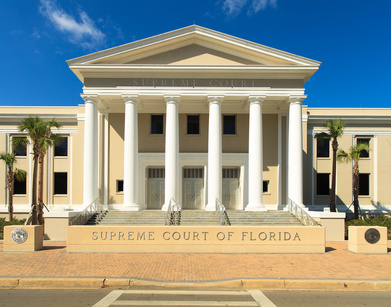Reversing a ruling by the Fourth District Court of Appeal, the Supreme Court of Florida recently held that a mortgagee’s voluntary dismissal of an appeal made the borrower the prevailing party entitled to recover appellate attorney’s fees because the mortgagee maintained its right to enforce the mortgage contract that contained a prevailing party attorney’s fees provision until it dismissed the appeal.
A copy of the opinion in Glass v. Nationstar Mortgage, LLC is available at: Link to Opinion.
A mortgagee filed an in rem foreclosure action on a reverse mortgage on real property. The borrower moved to dismiss the complaint for a variety of reasons, including that the holder lacked standing. The trial court ultimately dismissed the complaint with prejudice, but the dismissal order did not state the reason for dismissal.
The mortgagee appealed to the Fourth District Court of Appeal. After the parties submitted briefs, the mortgagee voluntarily dismissed the appeal before the Fourth District issued its ruling.
The borrower then moved for appellate attorney’s fees pursuant to section 57.105(7), Florida Statutes. The Fourth District denied the borrower’s motion for attorney’s fees holding that the borrower could not recover fees after seeking to dismiss the complaint for lack of standing.
The Florida Supreme Court accepted the borrower’s request for review.
Initially, the Florida Supreme Court noted generally that, “when a plaintiff voluntarily dismisses an action, the defendant is the prevailing party.” As such, the Court held, the Fourth District wrongly denied the borrower’s appellate attorney’s fees based on the mortgagee’s voluntary dismissal of the appeal.
The Florida Supreme Court also took issue with the Fourth District’s conclusion that the trial court dismissed the complaint because the borrower argued that the mortgagee lacked standing to foreclose because it misstated the trial court’s ruling and failed to address that the borrower’s motion for appellate attorney’s fees arose from the mortgagee’s voluntary dismissal.
Specifically, the Florida Supreme Court found that the “trial court granted the dismissal but did not provide any reasoning for its decision.” In addition, during the appeal the borrower advanced three arguments to affirm the dismissal order, only one of which was that the holder lacked standing to foreclose.
The Florida Supreme Court also distinguished the Fourth District’s reliance on Bank of New York Mellon Trust Co. v. Fitzgerald, 215 So. 3d 116 (Fla. 3d DCA 2017), which held that when no contract existed between a borrower and a lender, the borrower “could not invoke the reciprocity provisions of section 57.105(7).” Here, the Court noted, unlike Fitzgerald, the trial court never made a finding of fact that a mortgage contract never existed.
Additionally, although the law in Florida “is clear that a party is precluded from claiming attorney’s fees under a contract that has been found to have never existed,” the Court noted it is also true “that when parties enter into a contract and litigation later ensues over that contract, attorney’s fees may be recovered under a prevailing-party attorney’s fee provision contained therein even though the contract is rescinded or held to be unenforceable.”
Thus, the Florida Supreme Court reversed the Fourth District’s ruling, and held that the borrower was the prevailing party entitled to recover appellate attorney’s fees.


